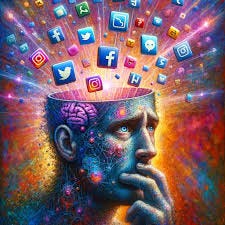Harris: We Are Losing the Information War with Ourselves
Trump is a creature of social media, and his performance in the wake of Charlie Kirk's murder is that of "an arsonist pretending to be a firefighter."
By Sam Harris
I began my “Truth & Consequences” speaking tour this week in Seattle and San Jose, and the assassination of Charlie Kirk was on everyone’s mind. Before stepping onstage, I received texts from several friends who wanted to know the details of my security. One family member urged me to cancel the whole tour immediately.
Kirk was a political prodigy on the Right and adored by a younger generation of Republicans. While I never met him, and didn’t follow his work closely, it was obvious that we weren’t political allies. It should go without saying that I feel nothing but sadness for him and his family.
His murder was an especially terrible crime for several reasons—the fact that it occurred on a college campus in front of thousands of students, the manner in which it was immediately broadcast on social media, the presence of his wife and children at the scene, and the unavoidable sense that both the causes and consequences had to be political. Whatever the killer’s motives, he dropped a match onto an information landscape that was ready to burn.
Since deleting my Twitter account nearly three years ago, I’ve generally ignored social media. However, in the last 48 hours I’ve spent enough time studying the response to Kirk’s death to be further convinced that platforms like X and TikTok are destroying our culture. No metaphor does the problem justice.
I’ve compared social media to a dangerous psychological experiment, a hallucination machine, a funhouse mirror, a digital sewer—but nothing captures the ludicrous insults, moral injuries, and delusions that millions of us avidly produce and consume online. If the medium is the message, the message is mass psychosis—and it will send us careening from one political emergency to the next.
The fact that some of the most deranging and divisive content is being created (or amplified) by foreign adversaries—and that we have literally built and monetized their capacity to do this—beggars belief. We are poisoning ourselves and inviting others to poison us.
More disturbing still, the effects are self-reinforcing.
Part of the reason for this is algorithmic—these platforms have been designed to raise the amplitude on our tribal hatreds, because this maximizes engagement. But the algorithms in our brains are little better: Seeing another person (or what appears to be another person) gleefully dance on a slain man’s grave, it is easy to conclude that they represent some significant faction of American society—and to feel the outrage appropriate to such a terrible discovery.
What Trump did. President Trump is a creature of social media, and his presidency would be unthinkable without it. Unfortunately, his address to the nation in response to Kirk’s murder evinced all the wisdom of an angry tweet.
Rather than speak in a way that would be expected of a normal president, he produced a dangerous piece of gaslighting—suggesting that the threat of political violence in America came exclusively from the Left and ignoring recent examples of rightwing attacks, including those carried out in his name. Rather than calling for calm and unity, he accused his political opponents of being accessories to murder. And most ominously, he implied that the full power of the federal government would soon be turned against them.
It was the behavior of an arsonist, pretending to be a firefighter. Of course, some will insist that this observation just heaps more fuel on the fire. But serious criticism of President Trump and Trumpism isn’t part of the problem of hyperpolarization in America—no more than serious criticism of the far Left is.
When Elon Musk announced to his 225 million followers on X that “The Left is the party of murder,” he wasn’t describing our political reality, but he was greatly damaging it. And when he posted, “If they won’t leave us in peace, then our choice is fight or die,” he joined a deranged chorus of prominent people on the Right who seem committed to viewing Kirk’s murder as the first shot fired in a civil war.
And who, after all, are “they”?
No morally sane person, Left or Right, supports political assassination—or feels anything but horror over it.
Fueling false narratives. Kirk’s killer is now in custody, and from the details that have been released, he doesn’t appear to be the far-Left golem conjured by the Right. He is a Utah native who grew up hunting with his Republican parents.
We don’t yet know why he did what he did, but there is a very good chance that he represents no cause beyond his own mental illness. As for the frequency and character of political violence in America, we shouldn’t delude ourselves about it. It isn’t at all a common form of murder, nor is it more prevalent on the Left.
There is no “party of murder” in this country. And insisting that there is just adds energy to yet another moral panic. Social media amplifies extreme views as though they were representative of most Americans, and many of us are losing our sense of what other people are really like.
Many seem completely unaware that their hold on reality is being steadily undermined by what they are seeing online, and that the business models of these platforms, as well as livelihoods of countless “influencers,” depend on our continuing to gaze, and howl, into the digital abyss.
Get off social media.
Read good books and real journalism.
Find your friends.
And enjoy your life.
Sam Harris is the author of five NYT bestsellers, host of the Making Sense podcast, and creator of the Waking Up app. You can subscribe to his newsletter here.
Image: Through the Noise.


Your article mention the many right wing attacks … Somehow I can’t think of any.